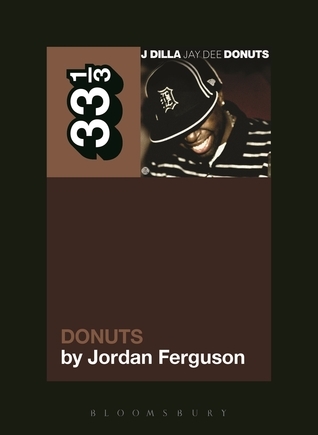What do you think?
Rate this book


136 pages, Paperback
First published April 24, 2014
“Listen to Donuts. Do you really think the dude didn’t know what was gonna happen to him? He fully knew what was gonna happen.”
‘—Donuts is a game of resonant emotion, a mind meld between its maker and the listener.’
‘Forget about dying for a minute. Forget about hospital beds and dialysis machines and wheelchairs. It almost seems unfair to do so, that’s how intrinsically linked they’ve become with the album. But put them aside. Imagine finding the album in a record store during that three-day window between its release and the day he died. How is one meant to listen to Donuts?’
‘J Dilla: “I used to listen to records and actually, I wouldn’t say look for mistakes, but when I heard mistakes in records it was exciting for me. Like, ‘Damn, the drummer missed the beat in that shit. The guitar went off key for a second.’ I try to do that in my music a little bit, try to have that live feel a little bit to it.”’
‘Everyone ultimately faces their end alone, there’s no prescription or rulebook for processing it, everyone faces it in their own way. Dilla faced it through music. As Donuts ends, one gets the sense he was coming to terms. That is, if Donuts even really ends. Play the CD on “repeat all,” and the end of “Welcome to the Show” feeds directly into the start of “Donuts (Outro).” The end is the beginning, the first is the last, and some things go on forever, like a circle. Like good music. Maybe like the human soul. Dilla being Dilla, though, he couldn’t let the ends of the album sync up perfectly: the transition between the two jerks and stutters just slightly as the album restarts. He always did love mistakes.’
‘Death is the great universal, the thread that connects me, you, Dilla, every living thing on this planet. We are all going to die. This is not something most individuals care to consider. Existence, consciousness itself, is an industry designed to distract us from that fact, the “screen,” Tolstoy wrote of in “The Death of Ivan Ilyich.” The story’s titular character, slowly succumbing to injuries sustained in a fall, tries to distract himself from that truth, but can never outrun it fully: “Suddenly it would flash from behind the screen, he would see it. It flashes, he still hopes it will disappear, but he involuntarily senses his side—there sits the same thing, gnawing in the same way, and he can no longer forget it.”
For many listeners, especially those with at least a passing familiarity with the album’s origins, Donuts rips down that screen, its music and messages a stark representation of one man confronting the truth of his mortality, which, while true, is a bit of a facile interpretation. Yes, the record is concerned with such matters, but it expresses that concern in a more nuanced and complicated manner, part of a conversation humanity has been having with itself for centuries.
From the moment humans learned how to think critically, they’ve been thinking critically about death, and most of that thinking centres on whether death is essentially good or bad. The idea is that if one can prove philosophically that death is not harmful, it doesn’t merit the fear and panic so often associated with it.’
‘Ask even the most stoic man if he’s prepared to die and he may say yes; tell him he’ll die in an hour and his response may be different. What does death really mean to the dying? What does it mean to sit there, as Dilla did, performing from a wheelchair on the other side of the world and face the thing we’re all trying to avoid, to have Ivan Ilyich’s screen torn down in front of you? What then? How do you process it, in life and in art?’
“(Egon) I think you know, in some weird way—he probably thought we were all sort of misfits in one way or another, but then again he didn’t necessarily fit in where he was. And he loved Los Angeles, he loved hanging out in the sunshine, and he loved kicking it with Madlib—You know it was just like, one of those things, man. We were just fucking there at the right time, and it was very unfortunate because it was the wrong time, too.”
‘Donuts was never meant for you. It was never meant for me. It’s a private and personal record, a conversation between an artist and his instrument, which just happens to be the history of recorded music. It’s the final testament of a man coming to terms with his mortality; a last love letter to his family and the people he cared about. It’s clearly a record about death; the evidence found in its rebus of samples, sequencing and song titles leaves little doubt of that.’
‘J Dilla would hate this book. I’ll never know this for a fact, and he’ll never be able to tell me himself, but everything I’ve read, everything I know about the man suggests he would not be a fan. This sort of intense examination of his older work seemed to make him extremely uncomfortable. His focus was always on forward movement.’